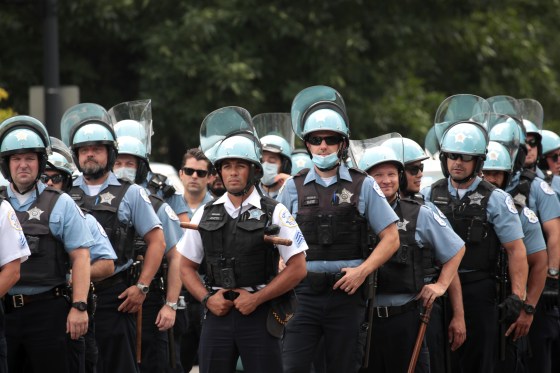The Chicago Police Department's hiring process, which stretches for more than a year, disproportionately reduces the number of Black candidates — especially women — hoping to join the department, according to a watchdog study released Thursday.
The city's Office of Inspector General analyzed Chicago police hiring practices from 2016 to 2018, chronicling the volume and rate of attrition, no-shows and success at each stage of the process based on race and gender.
The police force "has a disproportionately high attrition rate for Black candidates, especially Black female applicants, which contributes to the low number of Black officers hired," the review concluded.
It said Black candidates made up 37 percent of the applicant pool but just 18 percent of prospective officers invited to the police academy. In contrast, "Asian, Hispanic and White candidates increased in their proportion of the applicant pool by the end of the hiring process," the report found.
Prospective female officers who began the hiring process made up 34 percent of applicants, the report said, but only 27 percent were invited to the academy.
The inspector general is independent and nonpartisan.
Chicago police did not immediately respond to a request for comment Thursday afternoon. Officials also did not provide a gender and demographic breakdown of the force.
Deborah Witzburg, the deputy inspector general for public safety, said in a statement that the police department's hiring "does not reflect the City's rich demographic diversity — not because of the pool that goes into the process, but because of the pool that comes out of it."
"It is the disproportionate attrition of minority candidates throughout ... that drives underrepresentation of certain demographic groups among those hired," Witzburg said.
The 70-page watchdog report said that of Chicago's 13,000 police employees, about 11,000 are officers.
In 2017, more than half of the department's employees were white, 25 percent were Hispanic and 20 percent were Black, USA Today reported. That year, about 22 percent of the department's officers were women, the newspaper reported.
The inspector general's office said that the city's hiring process examines a candidate's cognitive and physical abilities, mental health and background and that it can take up to 1½ years.
The lengthy process means "losing qualified applicants who are unable or unwilling to wait so long to secure a position," the study said.
The watchdog report advocates for a shorter process.
In total, the inspector general's office made 17 recommendations to reduce attrition rates and diversify the force. Some included telling candidates about more disqualifying standards in the background investigation. Black men had the highest attrition rate during the background check, the report said.
Candidates were not assigned standardized identification numbers, which would help the department's record-keeping for candidates who applied multiple times, the report said. It also urged identifying attrition levels based on educational attainment and residency, and it recommended targeting recruitment in neighborhoods with less representation on the force.
The final recommendation was for appropriate departments to determine "whether it is informative and appropriate to collect data on sex assigned at birth in addition to gender."
A study published this year in the journal Science suggested that diversity in law enforcement can improve how officers treat people of color. The study analyzed nearly 3 million Chicago police patrol assignments and found that Black and Hispanic officers made fewer stops and arrests while using force less often, especially against Black people, than their white colleagues. The study also said female officers used force less frequently than men.
Over 100 shifts, Black officers made, on average, about 16 fewer stops and two fewer arrests, which resulted in a 20 percent to 30 percent reduction compared to white officers in similar scenarios, the study showed.
The inspector general's office referred to the study in Thursday's report, which said, "Diversity reforms can improve police treatment of minority communities."
Other studies have touched upon similar issues with Chicago's police force.
A 2017 Justice Department report found officers used force almost 10 times more often with Black suspects compared to white suspects. From 2004 to earlier this year, the city paid about $662 million in settlements in police misconduct cases.
